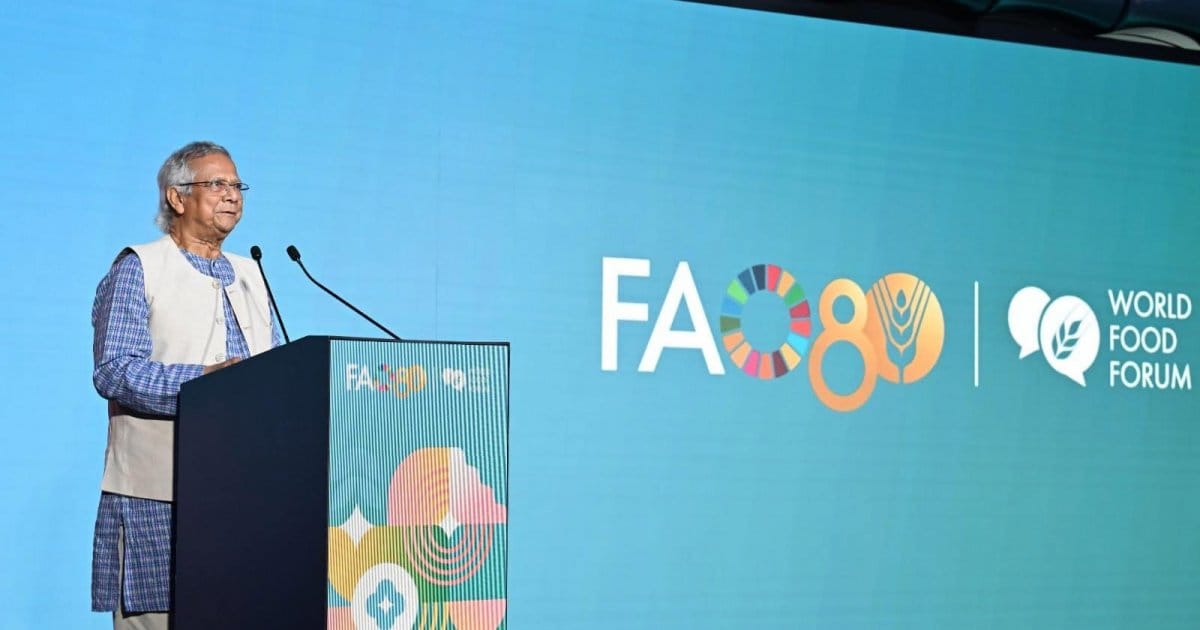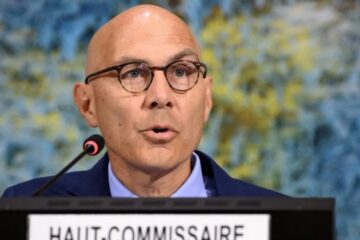Chief Adviser Prof Muhammad Yunus on Monday called on global leaders to end hunger and armed conflict, urging a fundamental shift in global priorities and economic systems.
Speaking at the 2025 World Food Forum (WFF) in Rome, hosted by the Food and Agriculture Organization (FAO), he proposed six transformative measures to ensure food security and sustainable development, highlighting the stark contrast between global military spending and the unmet financial needs to end hunger.
“While we couldn’t raise a few billion dollars to end hunger, the world spent $2.7 trillion on weapons. Is this how we define progress?” Prof Yunus asked during his keynote address.
His six-point agenda included breaking the hunger–conflict cycle by halting wars and ensuring food access in conflict zones, fulfilling Sustainable Development Goal (SDG) financing commitments, and taking climate action seriously.
He also called for the establishment of regional food banks to manage supply shocks, support for youth entrepreneurship through finance and infrastructure, reform of trade rules to promote food security, and expanded access to technology and innovation—particularly for rural youth in the Global South.
The WFF, running from October 10 to 17, is themed “Hand in Hand for Better Food and a Better Future,” and focuses on three pillars: Global Youth Action, Science and Innovation, and Hand-in-Hand Investment.
The forum brings together stakeholders across generations and sectors to accelerate progress toward the SDGs through inclusive dialogue and practical solutions.
Prof Yunus emphasized Bangladesh’s commitment to global cooperation, noting its role as a founding member of the Global Alliance Against Hunger and Poverty.
He praised FAO’s recognition of the Nobel Peace Laureates Alliance for Food Security and Peace, of which he is a member, as a milestone in the organization’s 80-year journey.
He challenged the prevailing economic framework, stating that hunger is not caused by scarcity but by systemic failure.
“We produce more than enough food. This is not a failure of production—it’s a failure of the economic system. It’s a moral failure,” he said.
Prof Yunus advocated for a shift from profit-maximizing business models to “social business”—enterprises designed to solve problems without personal profit.
He called for policy support and institutional recognition for social businesses, which he said are growing globally but remain under-supported.
He reiterated his vision for a “Three-Zero World”: zero wealth concentration to end poverty, zero unemployment through universal entrepreneurship, and zero net carbon emissions.
“This is not a dream—it is a necessity, the only way to save the world,” he said.
Highlighting the role of youth, Prof Yunus urged leaders to empower young people as job creators, not job seekers.
He called for the creation of social business funds, agri-innovation hubs, and support for climate-smart enterprises led by youth.
“If we invest in youth, they will not only feed the world—they will change the world,” he concluded.



